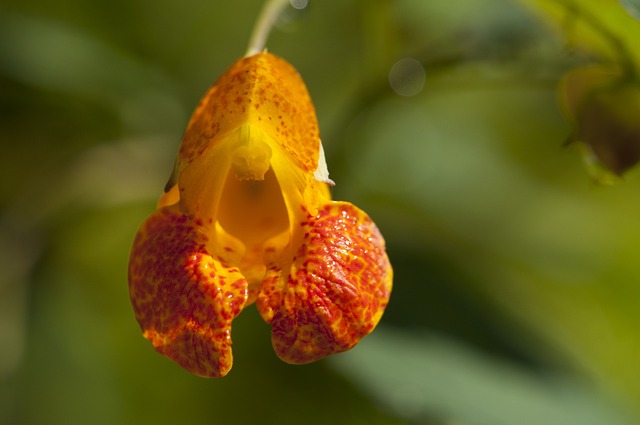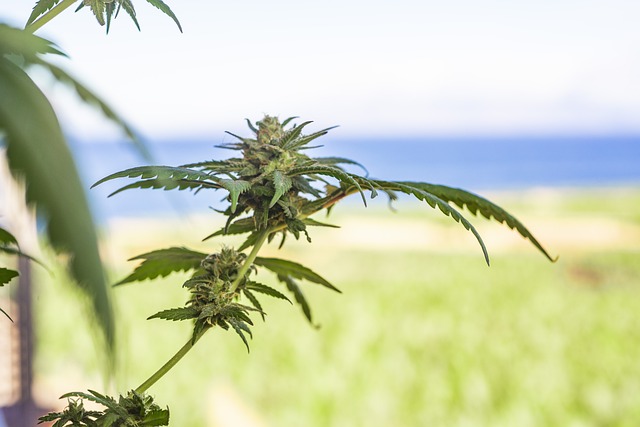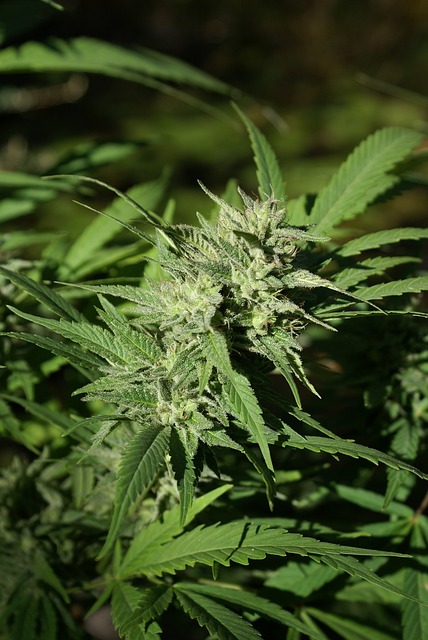
The THCA flower, a non-psychoactive compound found in hemp and marijuana, has been recognized for its significant anti-inflammatory properties. Studies indicate that THCA interacts with the body's endocannabinoid system through CB2 receptors, potentially offering therapeutic benefits for inflammatory conditions such as arthritis and colitis without inducing a high. Preliminary research suggests that THCA can suppress pro-inflammatory cytokines like TNF-α and IL-6, which are linked to chronic inflammation. The anti-inflammatory effects of THCA are believed to be more pronounced in its raw form and can be activated through decarboxylation for use in edibles or teas, or directly consumed through vaporization. For those seeking to incorporate THCA flower into their health regimen, it's important to consider dosage, timing of intake, and potential interactions with other substances, while also adopting a holistic lifestyle to enhance its anti-inflammatory effects. Clinical trials will further elucidate the efficacy and optimal use of THCA flower for various inflammatory disorders.
Discover the potential of THCA flower as a natural anti-inflammatory agent. This article delves into the therapeutic properties of THCA, a non-psychoactive compound found in hemp plants. We explore its anti-inflammatory effects and provide guidance on utilizing THCA flower effectively for health benefits. From understanding the science behind its action to practical tips for incorporating it into your wellness routine, this comprehensive guide offers valuable insights for those interested in natural remedies for inflammation.
- Unveiling THCA Flower's Anti-Inflammatory Properties: A Deep Dive
- The Science Behind THCA Flower's Role in Inflammation Reduction
- Optimal Usage and Preparation of THCA Flower for Maximum Benefit
- Integrating THCA Flower into Your Anti-Inflammatory Regimen: Practical Tips and Considerations
Unveiling THCA Flower's Anti-Inflammatory Properties: A Deep Dive

Delta-9-tetrahydrocannabinolic acid (THCA) is the non-psychoactive precursor to the well-known cannabinoid delta-9-tetrahydrocannabinol (THC). Found abundantly in raw cannabis plants, THCA flower has garnered attention for its potential health benefits, particularly its anti-inflammatory effects. Emerging research suggests that THCA interacts with the body’s endocannabinoid system through CB1 and CB2 receptors, offering a modulatory role in inflammation response. This interaction may be beneficial in addressing various inflammatory conditions, as it could potentially suppress pro-inflammatory cytokines and mediators without the psychoactive side effects associated with THC.
Furthermore, studies have indicated that THCA flower may exert its anti-inflammatory properties through several mechanisms of action. It has been observed to inhibit the activity of certain enzymes responsible for pro-inflammatory responses, thus offering a therapeutic potential for conditions like arthritis, colitis, and other inflammation-related diseases. The flower’s anti-inflammatory effects are also thought to be enhanced when consumed in its natural form, as opposed to being combusted. This suggests that THCA could be an effective component in a holistic health regimen aimed at reducing inflammation, although further clinical trials are necessary to fully elucidate its efficacy and optimal dosing for various conditions.
The Science Behind THCA Flower's Role in Inflammation Reduction

Delta-9-tetrahydrocannabinolic acid (THCA), the non-psychoactive precursor to the well-known cannabinoid delta-9-tetrahydrocannabinol (THC), has garnered attention for its potential anti-inflammatory effects. Studies suggest that THCA found in hemp flowers possesses a unique pharmacological profile, which may contribute to its anti-inflammatory properties. This profile includes the ability to inhibit certain enzymes and receptors involved in the body’s inflammatory response. For instance, THCA has been observed to interact with the CB2 receptor, a known target for modulating inflammation, without activating the high-affinity binding sites that THC does. This selective interaction may offer a therapeutic approach to managing inflammation-related conditions without the psychoactive effects associated with THC.
Furthermore, the anti-inflammatory effects of THCA are rooted in its influence on several cellular signaling pathways, including those mediated by nuclear factor kappa-light-chain-enhancer of activated B cells (NF-κB), which plays a critical role in the immune response. By modulating NF-κB activity, THCA may help to reduce the production of pro-inflammatory cytokines, such as tumor necrosis factor-alpha (TNF-α) and interleukin-6 (IL-6), which are often overproduced in conditions characterized by chronic inflammation. This mechanistic action is a subject of ongoing research, with the aim of understanding how THCA flower can be harnessed to alleviate symptoms associated with inflammatory disorders, potentially offering an alternative or complementary treatment option for those affected.
Optimal Usage and Preparation of THCA Flower for Maximum Benefit

THCA flower, rich in tetrahydrocannabinolic acid (THCA), is a non-psychoactive cannabinoid found in hemp and marijuana plants that exhibits potential anti-inflammatory effects. To harness these benefits, proper usage and preparation are key. For those interested in leveraging the anti-inflamatory properties of THCA flower, it’s important to consider the method of consumption. Consuming THCA flowers via smoking or vaporizing allows for rapid onset of effects, making it a preferred method for immediate relief from inflammation and discomfort. However, for those who wish to avoid inhalation, decarboxylation followed by ingestion as an edible or in tea can also unlock the therapeutic potential of THCA, albeit with a delayed onset due to the digestive process.
During preparation, it’s crucial to maintain the integrity of the THCA flower. This begins with proper storage in a cool, dark place to preserve its potency and prevent degradation. When ready to use, gentle handling is recommended to avoid grinding the flowers too finely, as this can increase exposure to heat during decarboxylation, potentially altering the chemical profile and reducing efficacy. For those looking to enhance the anti-inflammatory effects, consider incorporating additional ingredients known for their anti-inflammatory properties, such as turmeric or ginger, into your THCA flower preparation. This synergistic approach can amplify the beneficial effects of the THCA flower, offering a holistic solution to inflammation.
Integrating THCA Flower into Your Anti-Inflammatory Regimen: Practical Tips and Considerations

When considering the integration of THCA flower into an anti-inflammatory regimen, it’s crucial to understand the potential therapeutic effects of this cannabinoid. THCA, or tetrahydrocannabinolic acid, is the raw, non-psychoactive precursor to THC and has been studied for its anti-inflammatory properties. For those looking to harness these benefits, incorporating THCA flower into your daily routine can be done through various methods, such as vaporization, edibles, or direct inhalation. To maximize the anti-inflammatory effects of THCA, it’s recommended to choose high-quality, lab-tested THCA flowers with optimal cannabinoid and terpene profiles. Additionally, dosage is a key factor; start with a low dose to gauge your body’s response and gradually adjust as needed, adhering to any guidance provided by healthcare professionals. It’s also important to consider the timing of intake, as the anti-inflammatory effects may vary depending on whether you consume THCA flower in the morning, evening, or before/after physical activity.
For those with inflammation concerns, it’s essential to pair THCA flower use with a holistic lifestyle approach that includes a balanced diet, regular exercise, and adequate sleep. This comprehensive strategy can amplify the anti-inflammatory benefits of THCA. Furthermore, individuals should be mindful of potential interactions with medications or other supplements they may be taking. Consulting with a healthcare provider is always advisable to ensure safety and efficacy when adding THCA flower to your health regimen. By incorporating these practical tips and considerations, you can effectively integrate THCA flower into an anti-inflammatory plan aimed at promoting overall wellness.
THCA flower’s potential as a natural anti-inflammatory agent has been illuminated through scientific investigation, offering insights into its therapeutic properties. This article has delved into the mechanisms behind THCA flower’s influence on inflammation, providing readers with a comprehensive understanding of how to harness its benefits effectively. By following the practical tips and considerations outlined for its integration into an anti-inflammatory regimen, individuals can explore this natural option as part of their health and wellness strategies. The concluding research underscores the significance of THCA flower’s anti-inflammatory effects, paving the way for further exploration and potential applications in holistic health practices.





